跨文化交际整理
跨文化交际 资料整理
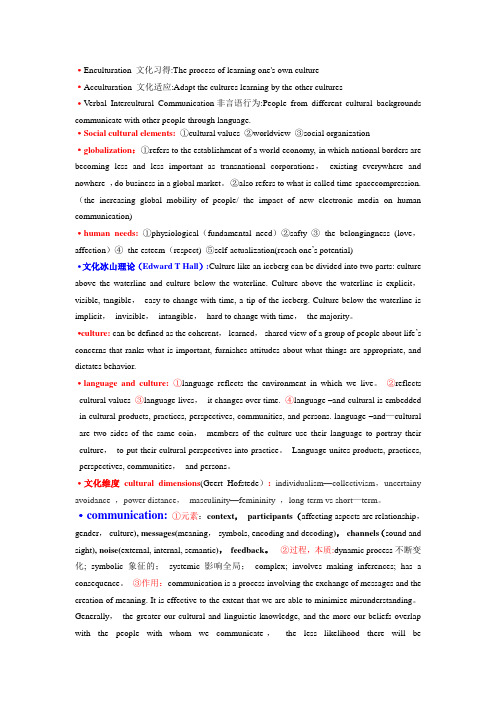
·Enculturation 文化习得:The process of learning one's own culture·Acculturation 文化适应:Adapt the cultures learning by the other cultures·Verbal Intercultural Communication非言语行为:People from different cultural backgroundscommunicate with other people through language.·Social cultural elements:①cultural values ②worldview ③social organization ·globalization:①refers to the establishment of a world economy,in which national borders are becoming less and less important as transnational corporations,existing everywhere and nowhere ,do business in a global market。
②also refers to what is called time-spacecompression.(the increasing global mobility of people/ the impact of new electronic media on human communication)·human needs: ①physiological(fundamental need)②safty ③the belongingness (love,affection)④the esteem(respect) ⑤self-actualization(reach one’s potential)·文化冰山理论(Edward T Hall):Culture like an iceberg can be divided into two parts: culture above the waterline and culture below the waterline. Culture above the waterline is explicit,visible, tangible,easy to change with time, a tip of the iceberg. Culture below the waterline is implicit,invisible,intangible,hard to change with time,the majority。
跨文化交际 知识点总结
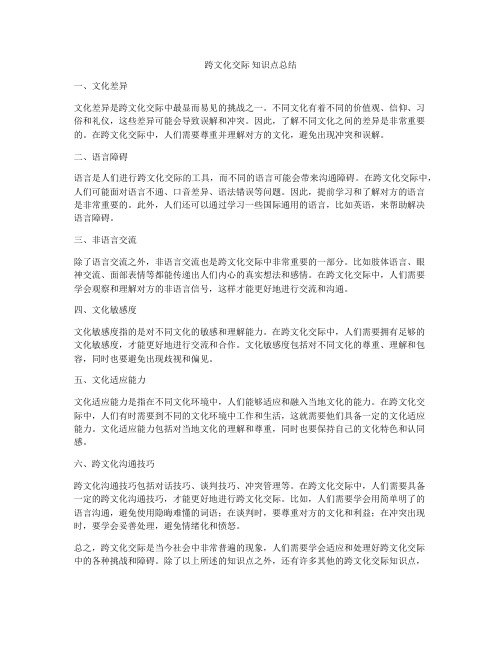
跨文化交际知识点总结一、文化差异文化差异是跨文化交际中最显而易见的挑战之一。
不同文化有着不同的价值观、信仰、习俗和礼仪,这些差异可能会导致误解和冲突。
因此,了解不同文化之间的差异是非常重要的。
在跨文化交际中,人们需要尊重并理解对方的文化,避免出现冲突和误解。
二、语言障碍语言是人们进行跨文化交际的工具,而不同的语言可能会带来沟通障碍。
在跨文化交际中,人们可能面对语言不通、口音差异、语法错误等问题。
因此,提前学习和了解对方的语言是非常重要的。
此外,人们还可以通过学习一些国际通用的语言,比如英语,来帮助解决语言障碍。
三、非语言交流除了语言交流之外,非语言交流也是跨文化交际中非常重要的一部分。
比如肢体语言、眼神交流、面部表情等都能传递出人们内心的真实想法和感情。
在跨文化交际中,人们需要学会观察和理解对方的非语言信号,这样才能更好地进行交流和沟通。
四、文化敏感度文化敏感度指的是对不同文化的敏感和理解能力。
在跨文化交际中,人们需要拥有足够的文化敏感度,才能更好地进行交流和合作。
文化敏感度包括对不同文化的尊重、理解和包容,同时也要避免出现歧视和偏见。
五、文化适应能力文化适应能力是指在不同文化环境中,人们能够适应和融入当地文化的能力。
在跨文化交际中,人们有时需要到不同的文化环境中工作和生活,这就需要他们具备一定的文化适应能力。
文化适应能力包括对当地文化的理解和尊重,同时也要保持自己的文化特色和认同感。
六、跨文化沟通技巧跨文化沟通技巧包括对话技巧、谈判技巧、冲突管理等。
在跨文化交际中,人们需要具备一定的跨文化沟通技巧,才能更好地进行跨文化交际。
比如,人们需要学会用简单明了的语言沟通,避免使用隐晦难懂的词语;在谈判时,要尊重对方的文化和利益;在冲突出现时,要学会妥善处理,避免情绪化和愤怒。
总之,跨文化交际是当今社会中非常普遍的现象,人们需要学会适应和处理好跨文化交际中的各种挑战和障碍。
除了以上所述的知识点之外,还有许多其他的跨文化交际知识点,比如文化适应、文化冲突解决等等。
跨文化交际知识点总结
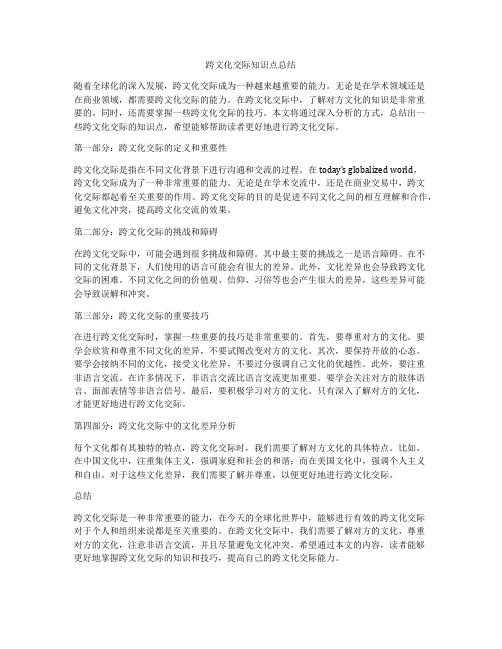
跨文化交际知识点总结随着全球化的深入发展,跨文化交际成为一种越来越重要的能力。
无论是在学术领域还是在商业领域,都需要跨文化交际的能力。
在跨文化交际中,了解对方文化的知识是非常重要的。
同时,还需要掌握一些跨文化交际的技巧。
本文将通过深入分析的方式,总结出一些跨文化交际的知识点,希望能够帮助读者更好地进行跨文化交际。
第一部分:跨文化交际的定义和重要性跨文化交际是指在不同文化背景下进行沟通和交流的过程。
在today’s globalized world,跨文化交际成为了一种非常重要的能力。
无论是在学术交流中,还是在商业交易中,跨文化交际都起着至关重要的作用。
跨文化交际的目的是促进不同文化之间的相互理解和合作,避免文化冲突,提高跨文化交流的效果。
第二部分:跨文化交际的挑战和障碍在跨文化交际中,可能会遇到很多挑战和障碍。
其中最主要的挑战之一是语言障碍。
在不同的文化背景下,人们使用的语言可能会有很大的差异。
此外,文化差异也会导致跨文化交际的困难。
不同文化之间的价值观、信仰、习俗等也会产生很大的差异,这些差异可能会导致误解和冲突。
第三部分:跨文化交际的重要技巧在进行跨文化交际时,掌握一些重要的技巧是非常重要的。
首先,要尊重对方的文化。
要学会欣赏和尊重不同文化的差异,不要试图改变对方的文化。
其次,要保持开放的心态。
要学会接纳不同的文化,接受文化差异,不要过分强调自己文化的优越性。
此外,要注重非语言交流。
在许多情况下,非语言交流比语言交流更加重要。
要学会关注对方的肢体语言、面部表情等非语言信号。
最后,要积极学习对方的文化。
只有深入了解对方的文化,才能更好地进行跨文化交际。
第四部分:跨文化交际中的文化差异分析每个文化都有其独特的特点,跨文化交际时,我们需要了解对方文化的具体特点。
比如,在中国文化中,注重集体主义,强调家庭和社会的和谐;而在美国文化中,强调个人主义和自由。
对于这些文化差异,我们需要了解并尊重,以便更好地进行跨文化交际。
跨文化交际知识点总结
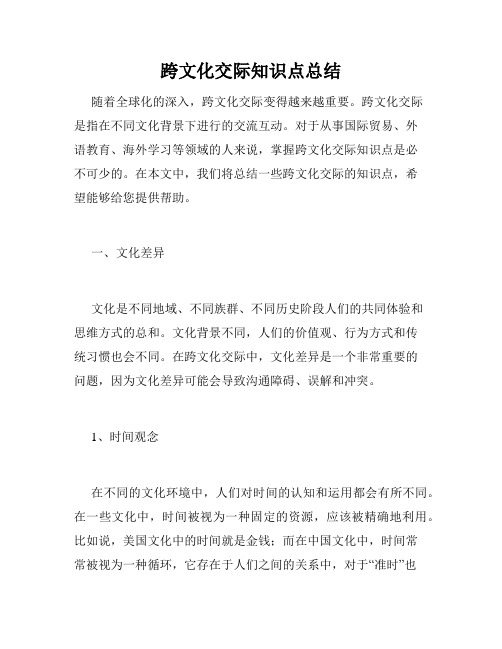
跨文化交际知识点总结随着全球化的深入,跨文化交际变得越来越重要。
跨文化交际是指在不同文化背景下进行的交流互动。
对于从事国际贸易、外语教育、海外学习等领域的人来说,掌握跨文化交际知识点是必不可少的。
在本文中,我们将总结一些跨文化交际的知识点,希望能够给您提供帮助。
一、文化差异文化是不同地域、不同族群、不同历史阶段人们的共同体验和思维方式的总和。
文化背景不同,人们的价值观、行为方式和传统习惯也会不同。
在跨文化交际中,文化差异是一个非常重要的问题,因为文化差异可能会导致沟通障碍、误解和冲突。
1、时间观念在不同的文化环境中,人们对时间的认知和运用都会有所不同。
在一些文化中,时间被视为一种固定的资源,应该被精确地利用。
比如说,美国文化中的时间就是金钱;而在中国文化中,时间常常被视为一种循环,它存在于人们之间的关系中,对于“准时”也有一些灵活的理解。
意大利、西班牙等南欧国家虽然有严谨的公共时间表,但在私人交往中强调情感和人际关系,在时间管理上相对宽松和弹性。
了解不同文化的时间概念,可以帮助我们更好地把握时间、精确地计划和实施任务,同时也能够避免因时间观念差异导致的误解和冲突。
2、礼仪习惯不同的文化中,人们对礼节和礼仪也会有所差异。
在日本、韩国等文化中,人们注重礼节和尊重他人,他们有很多规范和习惯需要遵守,比如在进屋时要脱鞋、在用餐时要用筷子等等。
在教堂、公共场所、重大活动等地区域中,西方文化中介绍穿着正式,男士要穿西服领带。
如果在跨文化交际中忽视和破坏这些礼仪和习惯,会引起对方的不满,降低你自己的形象和信誉度。
因此,尊重别人的文化习惯和传统礼仪是跨文化交际中一个很重要的方面。
3、语言差异不同的文化中,语言的表达方式也会有所不同。
中式英语且各地口音,甚至不同文化中的口头禅和惯用语,都可能会导致跨文化交际中的不同理解和误解。
比如,在西方国家中,对别人的称呼往往比较简洁明了,而在亚洲一些国家中,对别人的称呼往往会比较热情和亲切;在外国企业中,重要的决策和安排都可能会用英语或其他国际语言来表达,导致语言差异的问题尤为突出。
跨文化交际知识点汇总
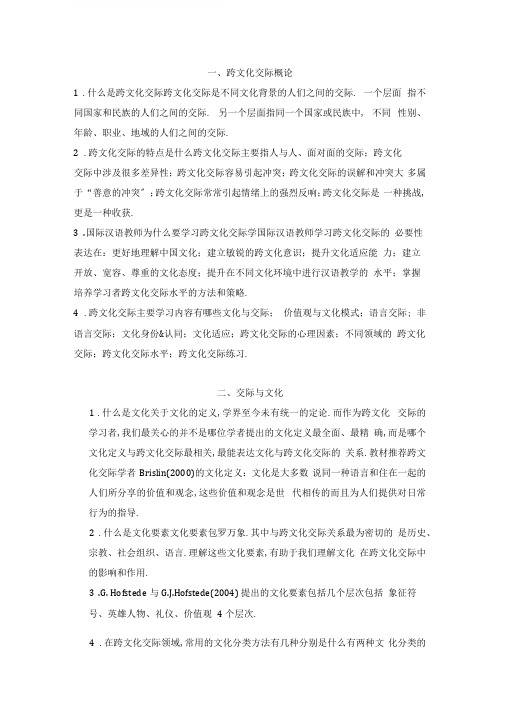
一、跨文化交际概论1.什么是跨文化交际跨文化交际是不同文化背景的人们之间的交际. 一个层面指不同国家和民族的人们之间的交际. 另一个层面指同一个国家或民族中, 不同性别、年龄、职业、地域的人们之间的交际.2.跨文化交际的特点是什么跨文化交际主要指人与人、面对面的交际;跨文化交际中涉及很多差异性;跨文化交际容易引起冲突;跨文化交际的误解和冲突大多属于“善意的冲突〞;跨文化交际常常引起情绪上的强烈反响;跨文化交际是一种挑战,更是一种收获.3.国际汉语教师为什么要学习跨文化交际学国际汉语教师学习跨文化交际的必要性表达在:更好地理解中国文化;建立敏锐的跨文化意识;提升文化适应能力;建立开放、宽容、尊重的文化态度;提升在不同文化环境中进行汉语教学的水平;掌握培养学习者跨文化交际水平的方法和策略.4.跨文化交际主要学习内容有哪些文化与交际;价值观与文化模式;语言交际; 非语言交际;文化身份&认同;文化适应;跨文化交际的心理因素;不同领域的跨文化交际;跨文化交际水平;跨文化交际练习.二、交际与文化1.什么是文化关于文化的定义,学界至今未有统一的定论.而作为跨文化交际的学习者,我们最关心的并不是哪位学者提出的文化定义最全面、最精确,而是哪个文化定义与跨文化交际最相关,最能表达文化与跨文化交际的关系.教材推荐跨文化交际学者Brislin(2000)的文化定义:文化是大多数说同一种语言和住在一起的人们所分享的价值和观念,这些价值和观念是世代相传的而且为人们提供对日常行为的指导.2.什么是文化要素文化要素包罗万象.其中与跨文化交际关系最为密切的是历史、宗教、社会组织、语言.理解这些文化要素,有助于我们理解文化在跨文化交际中的影响和作用.3.G. Hofstede与G.J.Hofstede(2004) 提出的文化要素包括几个层次包括象征符号、英雄人物、礼仪、价值观4个层次.4.在跨文化交际领域,常用的文化分类方法有几种分别是什么有两种文化分类的方法在跨文化交际领域最为常用.一种是客观文化与主观文化.另二种是主导文化与亚文化.5.文化有什么特点呢〔1〕文化是后天习得的.〔2〕文化是共享的,并世代相传.〔3〕大局部文化是无意识的.〔4〕文化是象征的.〔5〕文化是动态的.6.什么是交际与文化的定义相似,关于交际的定义也非常丰富和复杂.教材仅推荐与跨文化交际语用领域相关的定义.即Gudykunst& Kim〔2003〕提出的关于交际的定义:交际是编码和解码的过程,但是这种编码和解码的过程并非单纯的传递和接受过程,而是包含着意义的协商和共建.7.交际的要素是什么交际是互相交往的过程,交际的全部过程包含以下要素:传送者、信息、编码、解码、媒介、反响、噪音.8.交际有什么特点〔1〕交际是象征的〔2〕交际是动态的过程〔3〕交际涉及意义的协商和共建〔4〕交际发生在意识的各个层面.〔5〕交际是特定语境中发生的.9.文化对交际有什么影响文化从两个层面影响交际:一是从文化标准的层面,二是从个人层面.文化影响着人们的感知.首先, 文化影响人们对外部刺激的选择.其次,文化影响人们对外部刺激的分类.第三,文化影响人们对外部刺激的意义联想.最后,文化影响人们对外部刺激的解释.文化的特征值是它为行为提供指南.文化影响人们的饮食行为.文化还影响人们的衣着打扮.文化影响居住方式.文化影响人们的出行方式.文化也影响了人与人交往的方式.1.什么是价值观价值观不是实际的行为, 而是关于行为的规那么;价值观是一套关于什么是真善美的标准系统;这些规那么和标准是用来判断和指导人们的行为的;价值观不是个人的爱好或倾向,而是一种集体的文化意识.2.价值观如何分类一类是终极性价值观, 它是关于生命、生存等终极目标的价值观,另一类是工具性价值观,它是关于道德和水平的价值观.3.价值观有什么特点〔1〕价值观属于深层文化.〔2〕价值观是人们的行为指南. 〔3〕价值观既是稳定的,也是变化的.〔4〕不同文化的价值观既有相同的也有不同的成分.〔5〕价值观被违背时会引起情感上的强烈反响.4.关于价值观模式的研究具有影响力的理论是哪些1.价值取向理论〔由kluckhohn与Strodtbeck提出〕2.文化尺度〔由Hofstede提出〕3.高语境文化与低语境文化〔由Hall提出〕.5.中国文化模式有什么特点〔 1〕集体主义〔2〕以家庭为中央〔3〕尊重传统〔4〕等级观念〔5〕面子观念〔6〕重视人情6.美国文化模式有什么特点〔 1〕个体主义〔2〕平等观念〔3〕强调变化和进步〔4〕物质享受〔5〕科学与技术〔6〕工作与娱乐〔7〕竞争意识四、跨文化的语言交际1概念提要:1.萨丕尔-沃尔夫假说的含义萨丕尔-沃尔有三层含义.〔1〕不同的语言以不同的方式感知和划分世界.〔2〕一个人所使用的语言结构影响他感知和理解世界的方式.〔3〕讲不同语言的人感知世界是不同的.2.语言与价值观之间是什么关系语言与文化的关系最直接的表达是语言表达了人们对世界的看法、态度和价值取向.每种语言都拥有丰富的格言、警句和俗语.这些句子往往就是价值观的表达.3.词义与文化是什么关系在语言的各要素中,词汇与文化的关系最为密切,其对跨文化交际的影响也最为突出.语言的含义不具有普遍性,它受到文化和语境的制约.不同语言和文化的人们进行跨文化交际时,可能会由于对词语含义的误解而产生交流的障碍.4.什么叫委婉语学习它有什么意义禁忌是人类社会普遍存在的文化现象, 人们对诸如生老病死、隐私等许多方面多有避讳,因此产生了大量的委婉语. 了解不同文化中的禁忌和相应的委婉语不仅可以深入理解不同文化的价值取向,也可以防止在跨文化交际中出现不必要的误会.四、跨文化的语言交际2概念提要:1.礼貌原那么包括哪些准那么〔1〕得体准那么〔2〕慷慨准那么〔3〕赞扬准那么〔4〕谦虚准那么〔5〕一致准那么〔6〕同情准那么.2.中国人的礼貌特征包括哪些〔1〕贬己尊人〔2〕称呼准那么〔3〕文雅准那么〔4〕求同准那么〔5〕德、言、行准那么.3.礼貌策略的使用受到什么因素的制约〔1〕说话人与听话人之间的权力距离〔2〕说话人与听话人之间的社会距离〔3〕言语行为的强加程度4.什么是交际风格交际风格是指说话的特点.5.在跨文化交际领域中,常见的交际风格包括哪些〔1〕直接与间接的交际风格〔2〕谦虚与自信的交际风格〔3〕归纳与演绎的交际风格五、跨文化的非语言交际概念提要:1.什么是非言语交际非言语交际不包括语言,而是包括了各种非语言的交际行为;非语言交际具有互动性,涉及信息的发出者和接受者的编码和解码过程;非言语交际是在特定情境中产生的,与语境有密切关系;非语言交际可能是有意的,也可能是无意的.2.非语言交际的功能有哪些〔 1〕传达真实的内在感情〔2〕营造交际印象〔3〕进行会话治理3.非语言交际与语言交际是什么关系非语言交际对语言信息起着重复、补充、代替、标准和否认等作用.4.体态语包括哪些人们的外貌服饰、面部表情、眼神交流、手势、姿势以及身体接触都是体态语,都参与了交际,是非语言交际的一局部.5.时间观念与文化之间有什么联系时间观念是非语言交际的重要维度, 也是价值观的表达.6.什么是单时制文化其特点是什么单时制文化中的时间是线性的,可以向前延伸到未来,向后延伸到过去.单时制文化的人们通过方案和预约来限制时间,在一段时间内只做一件事,强调准时、预约和最后期限.7.什么是多时制文化其特点是什么多时制文化并不把时间看做是线性的.多时制文化中的人认为时间围绕着生活,在同一时间内可以做多件事情.工作常常被打断,方案也常改变.身处多时制文化中的人,维系人际关系和谐远比遵守时间重要.8.人们对于空间的利用与文化之间有什么联系空间利用也是非语言交际的重要内容.空间利用方式表达了特定文化中人际关系的特点.六、文化适应概念提要:1.文化适应策略有哪些同化、别离、融合以及边缘化.2.文化适应是一个复杂、动态的开展过程.短期旅居者的跨文化适应过程分为哪几个阶段蜜月期、挫折期、恢复期和适应期.3.焦虑处理理论认为什么因素影响跨文化适应个体性格因素、社会支持、性别、民族、处理文化适问题的策略等.4.什么是文化休克文化休克是一种因失去了熟悉的社会交往符号而产生的心理焦虑.5.应对文化休克可采取什么策略应对呢广交朋友,建立良好人际关系;学习目的国的语言;了解目的文化的知识;做自己感兴趣的事情;参加社会文化活动;改变自己的思维.6.什么是文化适应假说第二语言教学领域的学者很早注意到了文化适应与第二语言学习的关系.Schuman(1986跟出了文化适应假说〞.他认为, 学习者只有适应了第二文化以后才能习得第二语言,文化适应的程度决定第二语言学习的程度.7.Schuman(198觎出的社会距离的概念是什么社会距离指的是学习者的原有文化与目的语文化之间的差异程度.七、跨文化的人际交往概念提要:1.人际关系与文化的联系表达在哪几方面不同文化间的朋友关系、人情关系、工作关系、与陌生人之间的关系都受到文化的影响.2.交往习俗与文化之间有什么联系在社会交往中,人们需要遵循社交礼仪和规那么,而这些规那么会因文化而异.一种文化中得体、礼貌的规那么到了另一种文化中可能是不得体的,甚至还造成了冒犯.了解不同文化的社交习俗和礼仪,对提升跨文化交际的有效性和得体性是非常有必要的.3.公共礼仪与文化之间有什么联系遵守公共秩序和礼仪是现代人的基本素养,也是一个国家文明程度的表达. 在跨文化交往中,了解和遵守不同文化的公共礼仪非常重要.不遵守公共礼仪会给人留下负面的印象,甚至引起跨文化交往中的冲突.八、跨文化人际交际的心理与态度概念提要:1.什么是刻板印象刻板印象又作成见〞与谊型观念〞,是指一个群体成员特征的概括性看法.2.刻板印象有什么特点〔1〕刻板印象是人们正常思维的一局部.〔2〕刻板印象是文化的一局部.〔3〕刻板印象的最大局限是以偏概全,无视个体差异.3.如何克服刻板印象〔1〕意识到刻板印象的存在.〔2〕改变懒惰和简化的思维习惯.〔3〕扩大与不同文化的人的接触范围.〔4〕试图寻找充分的证据和例外的情况.〔5〕对于来自其他文化的个人的行为的描述,应采用表达性语言,而不是对这一文化群体进行评价和简单概括.4.什么是偏见偏见是对一个群体的成员建立在错误而僵化的概括根底上的负面感情5.如何克服偏见〔1〕坦诚面对自己的偏见.〔2〕扩大与不同文化的人的接触范围.〔3〕参加课程学习和培训.〔4〕在交际中防止使用带有偏见或歧视色彩的表达方式,特别是对弱势群体要注意使用委婉而礼貌的称呼.6.什么是种族中央种族中央指的是在思考和评价别的文化时,把自己的文化放在一切事物的中央位置,并且以自己文化的框架作为衡量的标准.7.什么是文化相对主义文化相对主义是与种族中央主义相对的概念.它最早由美国著名人类学家弗朗兹博厄斯所倡导.其包括两个方面的内容.第一, 每种文化都有自己长期形成的独特历史, 其形态并无上下之分;第二,任何一个民族都有自己的社会思想、世界观和道德观,人们不应该用自己的一套标准来衡量其它民族的文化.。
跨文化交际知识点

跨文化交际知识点跨文化交际知识点:1.L.S.Hams认为,在世界范围内的交际经历了五个阶段:语言的产生、文字的使用、印刷术的发明、近百年交通工具的进步和通讯手段的迅速发展、跨文化交际。
近20年来的交际是以跨文化交际为特征的。
2.跨文化交际学首先在美国兴起,与人类学、心理学、传播学关系密切。
3.Edwar Hall《无声的语言》是跨文化交际的奠基之作。
4.1970年,国际传播学会承认跨文化交际学是传播学的一个分支,成立了跨文化交际学分会。
5.1972年,第一届跨文化交际学国际会议在日本东京召开。
6.70年代影响最大的书籍是《跨文化交际学选读》。
7.Jenny Thomas《跨文化语用失误》:语用—语言失误;社交—语用失误。
8.前苏联的跨文化交际学主要表现在国情语言学方面。
9.传播种类:(1)人类传播①社会传播A交集传播B组织传播C大众传播②非社会传播(2)非人类传播10.早期影响最大的传播模式是Harold Lasswell提出的5w模式。
即who、say what、in what channel、to whom、with what rffects。
11.1949年Claude Shannon和Warren Weaver共同提出了线性模式,增加了“噪音”(干扰因素),把媒介分解。
12.50年代,Charles Osgood和Wilbur Schramm提出循环式的模式,加入“反馈”。
13.社会学家Jack Lyle与M.Lyle把传播过程看作是社会过程之一,特点是把传播放在社会环境中考察。
14.我国最早的辞书《尔雅》。
15.萨丕尔—沃尔夫假说基于对印第安语的研究。
16.red caipet treatment用红毯接待red-light district红灯区red flags提高警惕预防出事的状况in the red赤字17.politics—“中性”含贬义,为争权夺利不惜采取各种手段的意思;政治—“中性”,实际用时有褒义。
跨文化交际 知识点整理
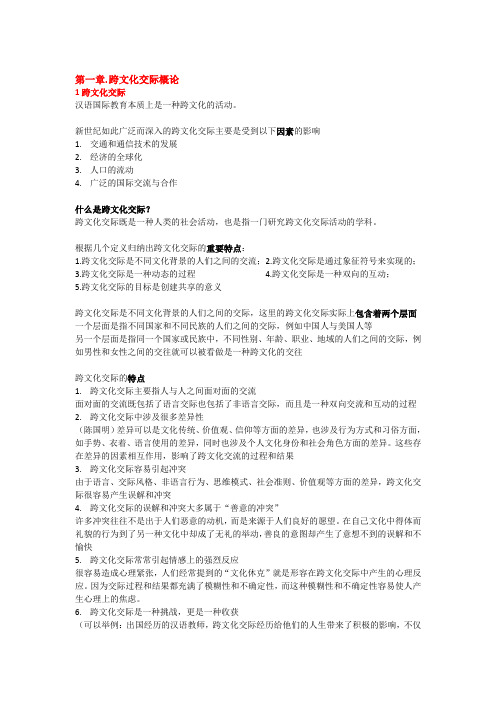
第一章.跨文化交际概论1跨文化交际汉语国际教育本质上是一种跨文化的活动。
新世纪如此广泛而深入的跨文化交际主要是受到以下因素的影响1.交通和通信技术的发展2.经济的全球化3.人口的流动4.广泛的国际交流与合作什么是跨文化交际?跨文化交际既是一种人类的社会活动,也是指一门研究跨文化交际活动的学科。
根据几个定义归纳出跨文化交际的重要特点:1.跨文化交际是不同文化背景的人们之间的交流;2.跨文化交际是通过象征符号来实现的;3.跨文化交际是一种动态的过程4.跨文化交际是一种双向的互动;5.跨文化交际的目标是创建共享的意义跨文化交际是不同文化背景的人们之间的交际,这里的跨文化交际实际上包含着两个层面一个层面是指不同国家和不同民族的人们之间的交际,例如中国人与美国人等另一个层面是指同一个国家或民族中,不同性别、年龄、职业、地域的人们之间的交际,例如男性和女性之间的交往就可以被看做是一种跨文化的交往跨文化交际的特点1.跨文化交际主要指人与人之间面对面的交流面对面的交流既包括了语言交际也包括了非语言交际,而且是一种双向交流和互动的过程2.跨文化交际中涉及很多差异性(陈国明)差异可以是文化传统、价值观、信仰等方面的差异,也涉及行为方式和习俗方面,如手势、衣着、语言使用的差异,同时也涉及个人文化身份和社会角色方面的差异。
这些存在差异的因素相互作用,影响了跨文化交流的过程和结果3.跨文化交际容易引起冲突由于语言、交际风格、非语言行为、思维模式、社会准则、价值观等方面的差异,跨文化交际很容易产生误解和冲突4.跨文化交际的误解和冲突大多属于“善意的冲突”许多冲突往往不是出于人们恶意的动机,而是来源于人们良好的愿望。
在自己文化中得体而礼貌的行为到了另一种文化中却成了无礼的举动,善良的意图却产生了意想不到的误解和不愉快5.跨文化交际常常引起情感上的强烈反应很容易造成心理紧张,人们经常提到的“文化休克”就是形容在跨文化交际中产生的心理反应。
跨文化交际整理版
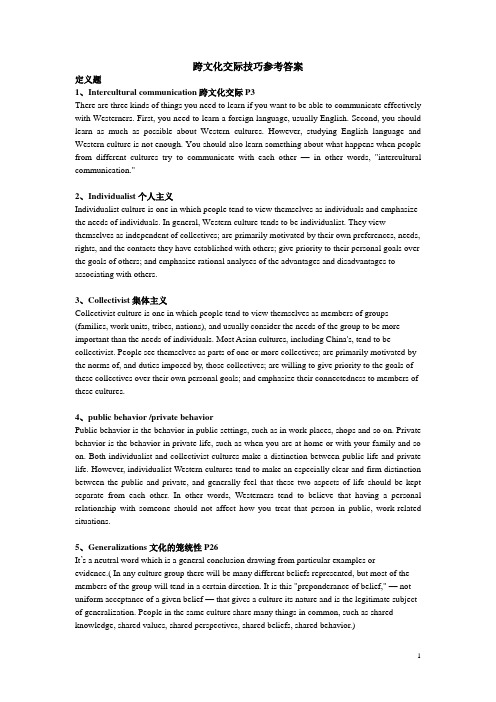
跨文化交际技巧参考答案定义题1、Intercultural communication跨文化交际P3There are three kinds of things you need to learn if you want to be able to communicate effectively with Westerners. First, you need to learn a foreign language, usually English. Second, you should learn as much as possible about Western cultures. However, studying English language and Western culture is not enough. You should also learn something about what happens when people from different cultures try to communicate with each other —in other words, "intercultural communication."2、Individualist个人主义Individualist culture is one in which people tend to view themselves as individuals and emphasize the needs of individuals. In general, Western culture tends to be individualist. They view themselves as independent of collectives; are primarily motivated by their own preferences, needs, rights, and the contacts they have established with others; give priority to their personal goals over the goals of others; and emphasize rational analyses of the advantages and disadvantages to associating with others.3、Collectivist集体主义Collectivist culture is one in which people tend to view themselves as members of groups (families, work units, tribes, nations), and usually consider the needs of the group to be more important than the needs of individuals. Most Asian cultures, including China's, tend to be collectivist. People see themselves as parts of one or more collectives; are primarily motivated by the norms of, and duties imposed by, those collectives; are willing to give priority to the goals of these collectives over their own personal goals; and emphasize their connectedness to members of these cultures.4、public behavior /private behaviorPublic behavior is the behavior in public settings, such as in work places, shops and so on. Private behavior is the behavior in private life, such as when you are at home or with your family and so on. Both individualist and collectivist cultures make a distinction between public life and private life. However, individualist Western cultures tend to make an especially clear and firm distinction between the public and private, and generally feel that these two aspects of life should be kept separate from each other. In other words, Westerners tend to believe that having a personal relationship with someone should not affect how you treat that person in public, work-related situations.5、Generalizations文化的笼统性P26It‟s a neutral word which is a general conclusion drawing from particular examples or evidence.( In any culture group there will be many different beliefs represented, but most of the members of the group will tend in a certain direction. It is this "preponderance of belief," — not uniform acceptance of a given belief — that gives a culture its nature and is the legitimate subject of generalization. People in the same culture share many things in common, such as shared knowledge, shared values, shared perspectives, shared beliefs, shared behavior.)6、Stereotypes老套思路P26It is a derogatory word. It means that image, idea, character that has become fixed or standardized in a conventional form without individuality and is therefore false and shallow.( A way of thinking that does not acknowledge internal difference within a group, and does not acknowledge exception to its general rules or principles. These stereotypes are often based on accurate information but the problem is that stereotypes blind us to other, equally important aspects of a person's character or behavior. Stereotypes may have been created by direct experience with only one or two people from a particular group. Others are probably based on the second-hand information and opinion, output from the mass media, and general habits of thinking; they may even have been formed without any direct experience with individuals from the group. Yet many people are prepared to assume that stereotype is an accurate representation of all members of a specific group.)7、Hierarchy不同的等级权利P33Different in rank and power----equalityEvery society has hierarchy to some degree. In other words, some people have higher rank and more power than others, perhaps because they are older, stronger, wealthier, or have some kind of official position. On the other hand, however, most modern societies also believe that equality is a virtue, at least to some extent. So each culture needs to find its own balance between hierarchy and equality.1) Westerners generally have less respect for seniority — age, position and so forth — than would be the case in a collectivist culture.2) Western societies often try to limit the power of government officials.3) Westerners tend to have a somewhat suspicious and even negative view of power and authority.8、Culture shock文化冲击P36Culture shock is a feeling of being confused and overwhelmed by life in another culture. People who experience culture shock often feel fatigued, impatient and irritable. They may also begin trying to avoid interaction with foreigners, and even become increasingly critical and hostile toward them. Foreigners in China sometimes experience culture shock — and so do Chinese who go to live in other countries.9、Projected cultural similarity P48Projected cultural similarity is the tendency to assume that people from other cultures basically think and feel more the same way we do. In other words, we sometimes assume that while foreigners may look different, dress differently, and speak different languages, "inside we are all more or less the same". People from different culture assume they understand each other instead of asking each other what they think. Because they each expect the other person to react more or less the same way they would, they don't check to see whether or not the other person actually has the same feelings and reactions they would.10、loose culture and tight cultureLoose culture doesn‟t demand a high degree of conformity. In loose cultures, people have a relatively wide range of views as to what is considered normal behavior. They also tend to berelatively tolerant of behavior that does not conform to cultural norms. And there is less pressure on individuals within the same culture to behave the same way most other people in the culture do. Tight culture: expect a relatively high degree of conformity. There is a clear consensus as to what is and is not acceptable behavior and there is more pressure on people to conform to the norms of the culture.Here is an example of how people deal with people who are born left-handed. In tight cultures, children who favor their left hand are encouraged or even forced to use their right hand instead, and the percentage of left-handed people in the adult population is much smaller.11、Ethnocentrism 民族优越感P59"Ethnocentrism" is the tendency to think of one‟s own culture as being at the center of the world and identify with one‟s in-group and to evaluate out-groups and their members according to its standards; in other words, to assume that one‟s own culture's way of thinking and acting is more natural, normal, and correct than the way people from other cultures think and act, and tend to view one‟s own cultural values and ways of doing things as more real, or as the …right‟ and natural values and ways of doing things.12、In-groups and out-groups P70In-Groups: “In-groups”are the people we have the most in common with and identify most closely with, such as our family, classmates, or co-workers. We also have larger in-groups such as people who are from our own region, religious group, ethnic group, or nation. In-groups are groups of people about whose welfare we are concerned, with whom we are willing to cooperate without demanding equitable returns, and separation from whom leads to discomfort or even pain. Out-groups: out groups are those groups of people who we do not identify with---people from other families, regions, ethnic groups, or nations. Out-groups are groups of people about whose welfare we are not concerned, and groups with whom we require an equitable return in order to cooperate.13、war stories P80The term “war stories” originally referred to the kinds of stories soldie rs would tell after experiences in battle. Now “war stories” refers more generally to any stories people tell after strange or stressful experiences, including stories about unusual encounters with foreigners.14 low context/ high context1.Low context: the way westerners communicate tends to be relatively explicit and direct. In other words, Westerners tend to put most of their ideas and feelings into words, and then state their ideas and feelings plainly and openly. It‟s generally considered a good thing to get to the point and say what you mean, and it‟s largely the speaker‟s responsibility to ensure that his/her massage is stated in a way that is clear and easy to understand. --low context, people are expected to pay more attention to the words used in communication than to context in which things are said. They expect others to …take them at their words‟-to believe that what they say is what they mean.2.High context: in collectivist cultures, people tend to communicate in a way that is more indirect and subtle, and listeners are expected to take more responsibility for inerpreting messages correctly. -High context, people are expected to pay much attention to the context in which communication takes place- who the speaker is, where and why the conversation is taking place, body language, and so forth-and when people interpret what others mean, they often give more weight to the context than to the actual words said. People in high context often view direct, explicit communication as unsophisticated or even rude.问答题1、Why would intercultural communication be more difficult than the communication between people from the same culture?(Why is it hard to learn a foreign culture?)先定义intercultural communication1)Some stumbling blocks2)Assuming more cultural similarities leads to misunderstanding3)Language difference4)Misinterpreting verbal communication and body language from other country5)Stereotype and preconceptions6)Evaluate before really understanding7)Interact with foreigners stressfully and suffer from culture shock8)Tend to generalize or simplify9)Tend to define groups by a few key characteristic10)Assume everyone is similar2、What are some differences between an individualist culture and a collectivist one?Are all Westerners individual ? Are all Chinese collectivist?先定义individualist 和collectivist(1) Westerners tend to believe that people should rely on themselves as much as possible- and they usually expect other people to do the same. In contrast, people in collectivist cultures generally feel they have a right to expect help from other members of their groups(family, classmates, and so forth), and they also tend to feel they have an obligation to help other members of their groups.(2) Westerners generally feel that the rights of individuals should not be subordinated to the needs of a larger group, or at least that individuals should have to right to decide for themselves whether to sacrifice their benefit for the sake of the group.(3) Westerners tend to believe that individuals should make decisions for themselves and that individuals should take credit and responsibility for what they have personally done.(4) A final difference lies in the way people in difference cultures view the idea of “individualism”. Westerners tend to view individualism as a good thing. In English, the word “individualism”has no negative connotation. In fact, its connotation is somewhat positive. In contrast, the Chinese term for “individualism” , often has a somewhat negative connotation, and is sometimes used as a synonym for “selfishness”.3、What are the different virtues Chinese and Americans emphasize most?先要定义一下virtueChinese: formality/ hierarchy/ industriousness/ being filial/ hard work/ modesty/ thrifty Americans: activity-dominant/ equality/ motivation based on achievement/ the world is material rather than spiritual/ optimistic/ individualist/ materialism/ success/ humanitarianism4、How do Western cultures view the relationship between public and private life?先定义public: work, national duty; private: home, family, personal friendshipsWestern cultures tend to make an especially clear and firm distinction between the public and private, and generally feel that these two aspects of life should be kept separate from each other. In other words, westerners tend to believe that having a personal relationship with someone should not affect how you treat that person in public, work-related situations. (In fact, some westerners try to avoid mixing work and play completely, and keep their circle of work acquaintances quite separate from their circle of personal friends)Of course, personal relationships do make a difference in how people in the west treat each other, even in public settings. However, the wall between public and private life tends to be somewhat higher in the individualist west than it is in collectivist cultures.5、What are stereotypes? Why are they a problem?It is a derogatory word. It means that image, idea, or chance that has become fixed or standardized in a conventional form without individuality and it is therefore false and shallow. A way of thinking that does not acknowledge internal difference within a group, exception to its general rules or principles. These stereotypes are often based on accurate information but the problem is that stereotypes blind us to other equally important aspects of a person‟s character or behavior. Stereotypes may have been created by direct experience with only one or two people from a particular group. Others are probably based on the second hand information and opinion outputfrom the mass media, and general habits of thinking; they may even have been formed without any direct experience with individuals from the group. Yet many people are prepared to assume that stereotype is an accurate representation of all members of a specific group.6、Try to think of several more generalization that can be made about important characteristics of Chinese culture.Collectivism: emphasis on the doctrine of the meanLarge power distance--hierarchyIntergroup harmony and avoidance of over conflict in interpersonal relationsBelief in the naturalness, necessity and inevitability of hierarchyInequality based on achievement, especially academic, moral and finance achievementBelief that “the judgment of wise people” is a better way to regulate life than rigid artificial laws. People exist “in and through relationship with others”Academic emphasis on memory, attention to details, and lengthy homeworkBrain washThe golden meanHypocriticalThe judgment of wise people/law8、What are the similarity and difference between Projected Cultural similarity and Ethnocentrism? P48两个定义Projected Cultural similarity and EthnocentrismThe similarity: both of them can not be avoided or overcame in intercultural communication. These two phenomena show that every country or nation considers their own culture as the center.The difference: E is taking one‟s own culture norms as the standard by which to judge people of other cultures. PCS is assuming that people of other cultures view things the same way you do. PCS: People have the tendency to assume that other people from other cultural background basically think and feel more or less the same way as they do.E: People have the tendency to think their culture has the superiority to others‟ and assume that their own culture‟s way of thinking and acting is more natural, normal and correct than the way people from other cultures‟ thinking and act.9、Comment on “Do unto others what you would have them do unto you. “P49先定义Projected cultural similarityThe sentence means that it‟s better not to do things to others what you don‟t want others do to you. This behavior shows the phenomena” projected cultural similarity”. In our cultural system, if you don‟t like thing done to you, you just don‟t impose on others. It‟s a kind of virtue. But from the aspect of PCS, people just assume people from other cultures view things the same way we do. What we think is right, we consider others will think it‟s right, too. However, it just doesn‟t work out like that. Because of different cultural background, we have different interpretations of everything happened. We can not expect others o think or act the same as we do.10、Why would people project cultural similarity? P49定义Projected cultural similarityIt is hard for people to imagine a perspective different from their own. It is effected by human nature, people are accustomed to self-centered. When they communicate with foreigners, they usually assume that foreigners are similar to us. As we grow up and learn what is right and wrong, truth and false, normal and abnormal, and so forth, we naturally learn to view the world as our culture view it. The only way to solve PCS is communication.11、comment on conformity in western cultures p56定义Loose cultures do not demand a high degree of conformity. In loose cultures, people have a relatively wide range of views as to what is considered normal behavior.Tight cultures, in contrast, expect a relatively high degree of conformity. There is a clear consensus as to what is and is not acceptable behavior, and there is more pressure on people to conform to the norms of the culture.Chinese culture is tight culture, and western cultures are loose culture. So conformity in western cultures is less in Chinese culture.Weak conformity12、What factors lead to looseness or tightness in culture? P54定义(1)The degree of change in the population--- the more people move, the looser and more individualist a society tends to be.(2)The density of the population.: small dense societies tend to be collectivist, hence tighter. Large dense society tend to be more complex, hence not quite so tight---melting pot.(3)The number of choices available in society--- the more choices available, the more room there is for individualism.(4)strict registration/registered permanent residence13、why does ethnocentrism cause difficulty in intercultural communication? P59定义ethnocentrismBecause we naturally feel that the ways and ideas of our culture are more natural and correct than those of other cultures. So we tend to use the norms of our own culture---such as the idea of what is good/bad, right/wrong, normal/abnormal—as standards when we judge the behavior of people from other cultures. So when we encounter foreigners who behave or think in ways that differ from our cultural norms, we too quickly tend to judge these other ways as strange, wrong or bad.14、Why are in/out-groups a problem in intercultural communication?P70定义We generally have more positive feelings toward members or our in-groups than we do toward outsiders. We trust insiders more. We tend to have a stronger sense of obligation to insiders. We feel it‟s right to help insider more than we help outsiders. We tend to judge in-groups and out-groups by different standards. To insiders, more generous but to outsiders, more critical, suspicious, more harsh judgments.So the tie of goodwill and trust between in-groups and out-groups are often relatively weak, and they break easily when there is conflict or misunderstanding.15、How do Chinese people treat in-group and out-group in line with culture back? P77定义There is a difference between the inside and the outside. Chinese generally have a high sense of loyalty and obligation to their in-groups, and will often go to great lengths to help people they consider members of their in-groups; however, they feel less obligation to outsiders.Chinese often view outsiders who come to china as guests., and give them much special treatment. In part, this is because Chinese view guests as a kind of in-group, and tend to treat in-group members very well.16、Never a borrower or a lender be. P79定义individualismAs it is firstly a famous American saying.This sentence means that ii is best to not lend money to other people and not to borrow from other people. When we lend or borrow something, we risk losing both things and the friendship with that person. To begin with, t is because westerners are in individualist cultures. In such kind culture, individualists tend to view themselves as individuals and to emphasize the needs of individuals. Individualists feel less obligation to others, whether they are in-groups or out-groups. Secondly, because of their characteristics, their individualism, western people tend to be very independent and self-reliant. They will always solve their problems by themselves. So they don‟t want others to rely on them. either.17、Characteristics of war stories P82The term “war stories”originally referred to the kinds of stories soldiers would tell after experiences in battle. Now, “war stories”refers more generally to any stories. People tell after strange or stressful experiences, including stories about unusual encounters with foreigners.War stories about intercultural communication tend to share several characteristics:(1)One reason we tell war stories is to get reassurance that our interpretation of the encountermakes sense.(2)In war stories, we generally portray ourselves as the hero or victim, and we often paint theforeigner as the “bad guy”.(3)We generally tell war stories to people who are likely to sympathize with us, usually peoplefrom our own culture rather than outsiders.(4)As we tell war stories, we often generalize from one specific experience to groups offoreigners as a whole.。
跨文化交际重点梳理

跨文化交际重点梳理跨文化交际是指在不同文化背景下进行交流和互动。
在一个全球化的世界中,跨文化交际变得越来越重要。
跨文化交际的目标是建立和维持不同文化之间的理解和合作关系。
然而,由于不同文化之间的差异,跨文化交际面临着许多挑战。
本文将重点梳理跨文化交际的关键点。
第一点是尊重和理解。
在跨文化交际中,尊重对方的文化背景和价值观是非常重要的。
了解对方的文化习俗和礼仪,避免不必要的冒犯。
同时,要有开放的心态去接纳和理解不同文化之间的差异,避免以自己的文化标准来评判对方。
第二点是语言和沟通。
语言是跨文化交际中最基本的工具。
如果能够掌握对方的语言,会更容易建立起良好的沟通。
即使不懂对方的语言,也可以通过非语言交流来进行沟通,比如表情、手势等。
在沟通中,要注意言辞的选择和表达方式,避免使用可能引起误解或冲突的词语和表达方式。
第三点是文化差异的认知和适应。
不同文化之间存在许多差异,包括价值观、信仰、习俗等。
了解这些差异并适应它们是跨文化交际的关键。
要学会尊重和接受不同文化的观点,不以自己的文化为标准去评判对方。
同时,要学会调整自己的行为和态度,以适应不同文化的环境和习俗。
第四点是文化敏感性和适应能力。
在跨文化交际中,对不同文化之间的差异有敏感性是非常重要的。
要善于观察和理解对方的行为和表达方式,避免陷入误解和冲突。
此外,要学会调整自己的行为和表达方式,以适应对方的文化习俗和社交规则。
第五点是跨文化交际的意识和知识。
了解不同文化的历史、政治、经济等方面的知识是非常有帮助的。
这些知识能够帮助理解对方的思维方式和价值观,并帮助建立起更深入的交流和合作关系。
同时,要保持对不同文化的持续学习和探索的意识,以不断提升自己的跨文化交际能力。
综上所述,跨文化交际是一项复杂而重要的能力。
尊重和理解、语言和沟通、文化差异的认知和适应、文化敏感性和适应能力,以及跨文化交际的意识和知识,是跨文化交际的关键点。
通过不断学习和实践,我们可以提升自己的跨文化交际能力,建立起更加和谐和有效的跨文化关系。
跨文化交际技巧总结

跨文化交际技巧总结在如今日益全球化的世界中,跨文化交际技巧对于个人和商业来说都变得至关重要。
跨文化交际技巧是指在不同文化背景下与他人进行有效沟通和相互理解的能力。
本文将总结一些跨文化交际技巧,以帮助读者在不同文化环境中更加自信地交流和互动。
1. 尊重和理解跨文化交际的第一步是尊重和理解他人的文化差异。
了解并尊重其他文化的价值观、信仰、习俗以及社会规范是建立良好关系的基础。
在沟通过程中,避免对他人的文化进行贬低或歧视,并尽可能理解他人的观点和行为背后的文化背景。
2. 学习语言和非语言沟通语言是交流的基础,学习对方的语言是实现有效跨文化交际的重要一步。
除了语言外,非语言沟通也是跨文化交际中的关键因素。
包括肢体语言、面部表情、眼神接触等,这些都在不同文化中可能具有不同的含义。
因此,学习并适应他人的非语言沟通方式将有助于更好地理解和表达意思。
3. 提升文化敏感度文化敏感度是指对其他文化的敏感和适应能力。
了解其他文化背景的历史、传统和价值观,能够更好地理解他人的行为和决策。
举个例子,一些西方国家的商务会议通常开始之前会有一些聊天和闲聊,这是为了建立良好的人际关系。
而在一些东方国家,商务会议可能直接进行正式的议程,避免太多废话。
理解这些文化差异可以帮助我们更好地适应和融入其他文化。
4. 保持开放的态度跨文化交际需要对不同文化的开放态度。
我们需要愿意接受和尊重他人的观点,避免以自己的文化标准来评判他人。
同时,也要乐于接受来自其他文化的反馈和批评,并根据需要进行调整和改进。
保持开放的态度可以帮助我们建立积极的互动关系,并在跨文化交际中取得更好的沟通效果。
5. 学习和适应不同的沟通风格不同的文化有不同的沟通方式和风格。
有的文化更加直接和坦率,而有的文化更注重间接和委婉。
因此,我们需要学习和适应不同的沟通风格。
了解他人的沟通方式,并适当调整自己的沟通风格,可以减少误解和冲突,并提高沟通的效果。
6. 学会倾听和提问倾听是良好沟通的关键。
跨文化交际整理
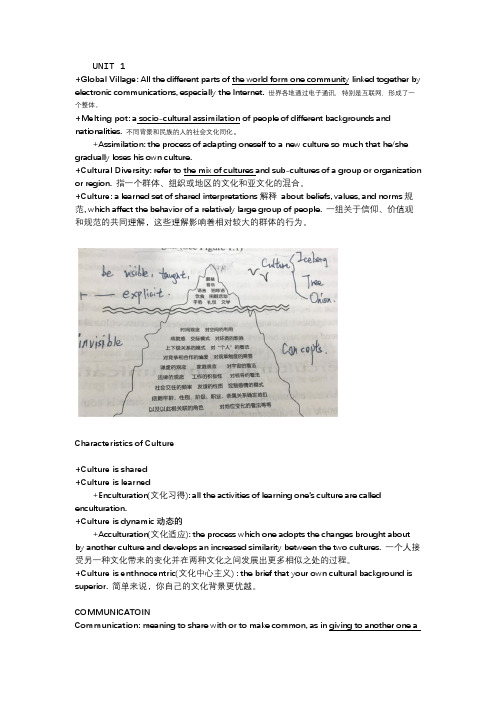
UNIT 1+Global Village: All the different parts of the world form one community linked together by electronic communications, especially the Internet. 世界各地通过电子通讯,特别是互联网,形成了一个整体。
+Melting pot: a socio-cultural assimilation of people of different backgrounds and nationalities. 不同背景和民族的人的社会文化同化。
+Assimilation: the process of adapting oneself to a new culture so much that he/she gradually loses his own culture.+Cultural Diversity: refer to the mix of cultures and sub-cultures of a group or organization or region. 指一个群体、组织或地区的文化和亚文化的混合。
+Culture: a learned set of shared interpretations解释about beliefs, values, and norms规范, which affect the behavior of a relatively large group of people. 一组关于信仰、价值观和规范的共同理解,这些理解影响着相对较大的群体的行为。
Characteristics of Culture+Culture is shared+Culture is learned+Enculturation(文化习得): all the activities of learning one’s culture are called enculturation.+Culture is dynamic动态的+Acculturation(文化适应): the process which one adopts the changes brought about by another culture and develops an increased similarity between the two cultures. 一个人接受另一种文化带来的变化并在两种文化之间发展出更多相似之处的过程。
跨文化交际知识点汇总
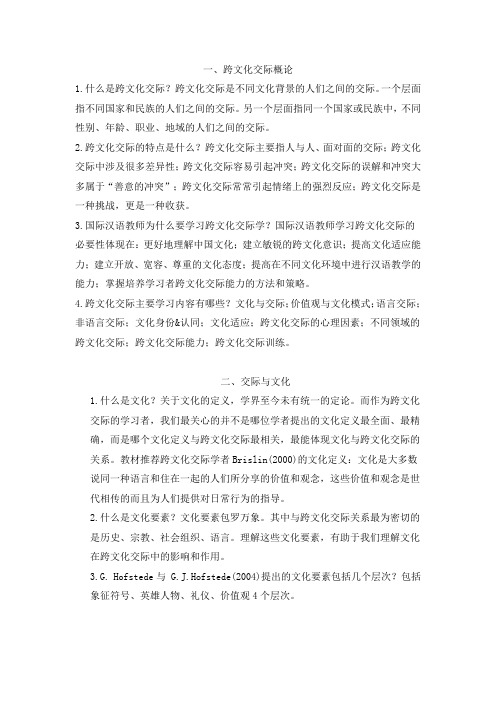
一、跨文化交际概论1.什么是跨文化交际?跨文化交际是不同文化背景的人们之间的交际。
一个层面指不同国家和民族的人们之间的交际。
另一个层面指同一个国家或民族中,不同性别、年龄、职业、地域的人们之间的交际。
2.跨文化交际的特点是什么?跨文化交际主要指人与人、面对面的交际;跨文化交际中涉及很多差异性;跨文化交际容易引起冲突;跨文化交际的误解和冲突大多属于“善意的冲突”;跨文化交际常常引起情绪上的强烈反应;跨文化交际是一种挑战,更是一种收获。
3.国际汉语教师为什么要学习跨文化交际学?国际汉语教师学习跨文化交际的必要性体现在:更好地理解中国文化;建立敏锐的跨文化意识;提高文化适应能力;建立开放、宽容、尊重的文化态度;提高在不同文化环境中进行汉语教学的能力;掌握培养学习者跨文化交际能力的方法和策略。
4.跨文化交际主要学习内容有哪些?文化与交际;价值观与文化模式;语言交际;非语言交际;文化身份&认同;文化适应;跨文化交际的心理因素;不同领域的跨文化交际;跨文化交际能力;跨文化交际训练。
二、交际与文化1.什么是文化?关于文化的定义,学界至今未有统一的定论。
而作为跨文化交际的学习者,我们最关心的并不是哪位学者提出的文化定义最全面、最精确,而是哪个文化定义与跨文化交际最相关,最能体现文化与跨文化交际的关系。
教材推荐跨文化交际学者Brislin(2000)的文化定义:文化是大多数说同一种语言和住在一起的人们所分享的价值和观念,这些价值和观念是世代相传的而且为人们提供对日常行为的指导。
2.什么是文化要素?文化要素包罗万象。
其中与跨文化交际关系最为密切的是历史、宗教、社会组织、语言。
理解这些文化要素,有助于我们理解文化在跨文化交际中的影响和作用。
3.G. Hofstede与 G.J.Hofstede(2004)提出的文化要素包括几个层次?包括象征符号、英雄人物、礼仪、价值观4个层次。
4.在跨文化交际领域,常用的文化分类方法有几种?分别是什么?有两种文化分类的方法在跨文化交际领域最为常用。
跨文化交际的分类
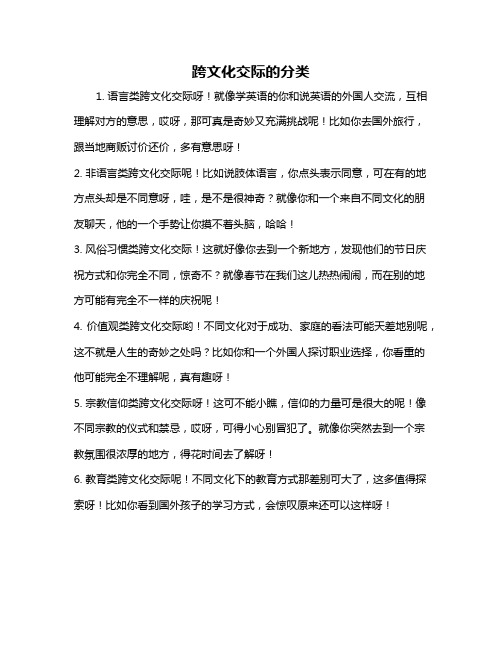
跨文化交际的分类
1. 语言类跨文化交际呀!就像学英语的你和说英语的外国人交流,互相理解对方的意思,哎呀,那可真是奇妙又充满挑战呢!比如你去国外旅行,跟当地商贩讨价还价,多有意思呀!
2. 非语言类跨文化交际呢!比如说肢体语言,你点头表示同意,可在有的地方点头却是不同意呀,哇,是不是很神奇?就像你和一个来自不同文化的朋友聊天,他的一个手势让你摸不着头脑,哈哈!
3. 风俗习惯类跨文化交际!这就好像你去到一个新地方,发现他们的节日庆祝方式和你完全不同,惊奇不?就像春节在我们这儿热热闹闹,而在别的地方可能有完全不一样的庆祝呢!
4. 价值观类跨文化交际哟!不同文化对于成功、家庭的看法可能天差地别呢,这不就是人生的奇妙之处吗?比如你和一个外国人探讨职业选择,你看重的他可能完全不理解呢,真有趣呀!
5. 宗教信仰类跨文化交际呀!这可不能小瞧,信仰的力量可是很大的呢!像不同宗教的仪式和禁忌,哎呀,可得小心别冒犯了。
就像你突然去到一个宗教氛围很浓厚的地方,得花时间去了解呀!
6. 教育类跨文化交际呢!不同文化下的教育方式那差别可大了,这多值得探索呀!比如你看到国外孩子的学习方式,会惊叹原来还可以这样呀!
7. 艺术审美类跨文化交际!艺术无国界呀,但审美却可以很不同哟!像不同文化的绘画、音乐风格,哇,那真的能让你大开眼界。
你想想听一场异域风格的音乐会,是不是超震撼?
8. 社交礼仪类跨文化交际呀!见面打招呼的方式、用餐礼仪等等都不一样呢,这多好玩呀!就像你在国外参加一场正式晚宴,得按他们的礼仪来,是不是感觉既新鲜又紧张呢!
我觉得呀,跨文化交际真的是丰富多彩、充满惊喜和挑战的呢!我们应该多多去了解和体验不同文化,让世界变得更加多元和有趣!。
(完整版)跨文化交际
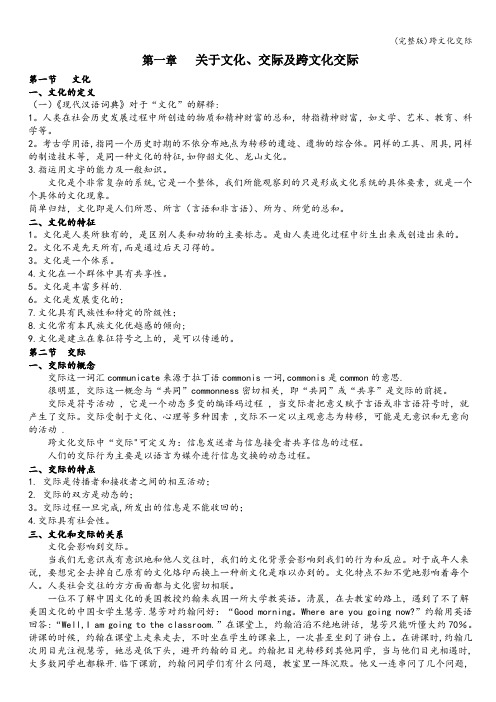
第一章关于文化、交际及跨文化交际第一节文化一、文化的定义(一)《现代汉语词典》对于“文化”的解释:1。
人类在社会历史发展过程中所创造的物质和精神财富的总和,特指精神财富,如文学、艺术、教育、科学等。
2。
考古学用语,指同一个历史时期的不依分布地点为转移的遗迹、遗物的综合体。
同样的工具、用具,同样的制造技术等,是同一种文化的特征,如仰韶文化、龙山文化。
3.指运用文字的能力及一般知识。
文化是个非常复杂的系统,它是一个整体,我们所能观察到的只是形成文化系统的具体要素,就是一个个具体的文化现象。
简单归结,文化即是人们所思、所言(言语和非言语)、所为、所觉的总和。
二、文化的特征1。
文化是人类所独有的,是区别人类和动物的主要标志。
是由人类进化过程中衍生出来或创造出来的。
2。
文化不是先天所有,而是通过后天习得的。
3。
文化是一个体系。
4.文化在一个群体中具有共享性。
5。
文化是丰富多样的.6。
文化是发展变化的;7.文化具有民族性和特定的阶级性;8.文化常有本民族文化优越感的倾向;9.文化是建立在象征符号之上的,是可以传递的。
第二节交际一、交际的概念交际这一词汇communicate来源于拉丁语commonis一词,commonis是common的意思.很明显,交际这一概念与“共同”commonness密切相关,即“共同”或“共享”是交际的前提。
交际是符号活动,它是一个动态多变的编译码过程,当交际者把意义赋予言语或非言语符号时,就产生了交际。
交际受制于文化、心理等多种因素 ,交际不一定以主观意志为转移,可能是无意识和无意向的活动 .跨文化交际中“交际"可定义为:信息发送者与信息接受者共享信息的过程。
人们的交际行为主要是以语言为媒介进行信息交换的动态过程。
二、交际的特点1. 交际是传播者和接收者之间的相互活动;2. 交际的双方是动态的;3。
交际过程一旦完成,所发出的信息是不能收回的;4.交际具有社会性。
三、文化和交际的关系文化会影响到交际。
跨文化交际学知识点
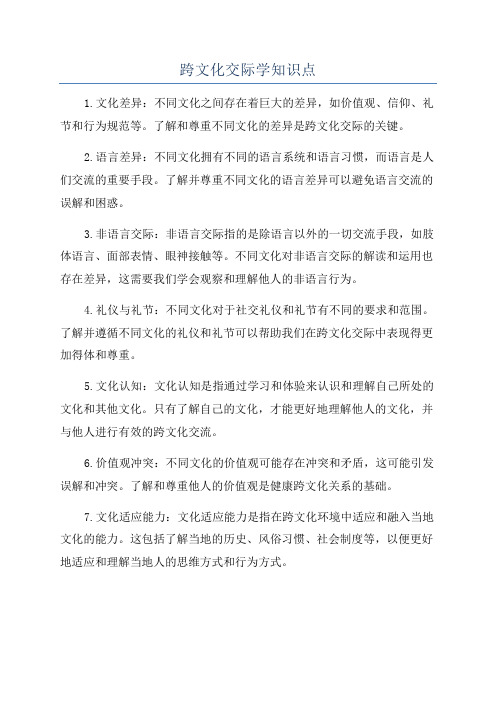
跨文化交际学知识点1.文化差异:不同文化之间存在着巨大的差异,如价值观、信仰、礼节和行为规范等。
了解和尊重不同文化的差异是跨文化交际的关键。
2.语言差异:不同文化拥有不同的语言系统和语言习惯,而语言是人们交流的重要手段。
了解并尊重不同文化的语言差异可以避免语言交流的误解和困惑。
3.非语言交际:非语言交际指的是除语言以外的一切交流手段,如肢体语言、面部表情、眼神接触等。
不同文化对非语言交际的解读和运用也存在差异,这需要我们学会观察和理解他人的非语言行为。
4.礼仪与礼节:不同文化对于社交礼仪和礼节有不同的要求和范围。
了解并遵循不同文化的礼仪和礼节可以帮助我们在跨文化交际中表现得更加得体和尊重。
5.文化认知:文化认知是指通过学习和体验来认识和理解自己所处的文化和其他文化。
只有了解自己的文化,才能更好地理解他人的文化,并与他人进行有效的跨文化交流。
6.价值观冲突:不同文化的价值观可能存在冲突和矛盾,这可能引发误解和冲突。
了解和尊重他人的价值观是健康跨文化关系的基础。
7.文化适应能力:文化适应能力是指在跨文化环境中适应和融入当地文化的能力。
这包括了解当地的历史、风俗习惯、社会制度等,以便更好地适应和理解当地人的思维方式和行为方式。
8.文化敏感度:文化敏感度是指对他人文化背景和差异的敏锐和尊重。
具备文化敏感度可以使我们更好地倾听和理解他人,并能够避免跨文化交流中的误解和歧视。
9.文化智商:文化智商是指在跨文化交际中应对挑战和解决问题的能力。
具备文化智商可以帮助我们处理跨文化交际中的困难和冲突,并能够建立有效的合作和关系。
10.跨文化沟通技巧:跨文化交际需要一定的沟通技巧,如倾听、提问、反馈和整合信息等。
掌握跨文化沟通技巧可以帮助我们更好地与他人交流和理解,以达到共同的目标。
总之,跨文化交际学的知识点涵盖了文化差异、语言差异、非语言交际、礼仪与礼节、文化认知、文化适应能力、文化敏感度、文化智商等方面。
掌握这些知识点可以帮助我们在跨文化交际中更好地理解他人,避免误解和冲突,建立良好的跨文化关系。
跨文化交际重点归纳
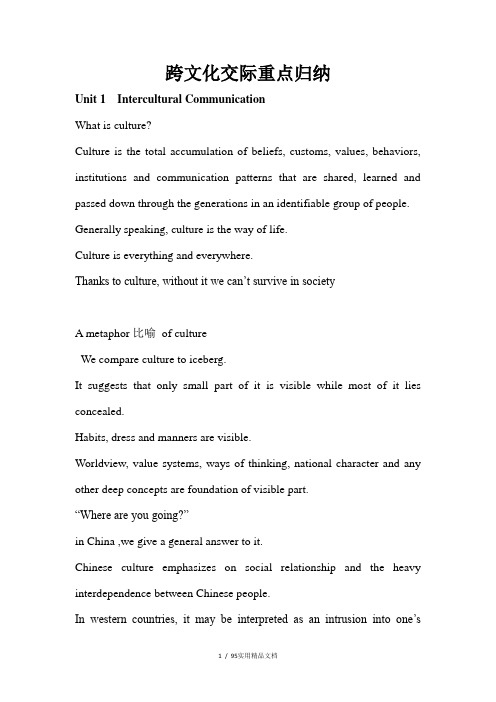
跨文化交际重点归纳Unit 1 Intercultural CommunicationWhat is culture?Culture is the total accumulation of beliefs, customs, values, behaviors, institutions and communication patterns that are shared, learned and passed down through the generations in an identifiable group of people. Generally speaking, culture is the way of life.Culture is everything and everywhere.Thanks to culture, without it we can’t survive in societyA metaphor比喻of cultureWe compare culture to iceberg.It suggests that only small part of it is visible while most of it lies concealed.Habits, dress and manners are visible.Worldview, value systems, ways of thinking, national character and any other deep concepts are foundation of visible part.“Where are you going?”in China ,we give a general answer to it.Chinese culture emphasizes on social relationship and the heavy interdependence between Chinese people.In western countries, it may be interpreted as an intrusion into one’sprivacy.The underlying individual-oriented relationship is the invisible part of the iceberg.exercise1. If you are a tourist guide, what are you expected to say when you are showing the foreign visitors to another site?A. This way, please.B. Come here, please.C. Follow me, please.D. Move on.2. A visitor stops you in the corridor of your head-office probably to ask for the way. What is your most likely reply to the visitor’s “Excuse me”?A. What’s the matter?B. Yes?C. That’s all right.D. Don’t worry.3. At a fair, a visitor, accidentally having knocked down your poster, says, “I’m terribly sorry.” What should you reply?A. It doesn’t matter.B. Never mind.C. Don’t worry.D. That’s all right.What is Intercultural communication?“Intercultural communication is contact between persons who identify themselves as distinct from one another in cultural terms.” (Collier & Thomas, 1998)intercultural communication refers to any communication between two members of any cultural communities. (Samovar & Porter)To further understand “intercultural communication”, please read the section of “Intercultural Communication Reading” on P.2 and answer the questions:1 In the story, why does Pete could not communicate well with Chinese students?Language problemCulture problemThe way Pete handled the intercultural communication situation2 What are the major barriers in intercultural communication? Language difference.(If we understand others’ language or dialect, but not their communication rules, we can made fluent fools of ourselves.) Nonverbal communication: gestures, postures, facial expression etc. Stereotypes: like culture, religion, idea, value, etc.Watch a video and get a deeper understanding.Classifications of Communicationverbal /nonverbalDirect /indirectInterpersonal / interorganizational / mass media-basedIntracultural /interculturalIntrapersonal / interpersonal/…Case studyRead the passage of “ an Intercultural Classroom”. This is the beginning of this passage:It was a hot day. Since it was still too early to use the air-conditioner, according to the regulations of the university, every class kept its door open to make the classroom cooler. While I was lecturing on Chinese grammar in Class 4, waves of laughter came from the neighboring Class 5. A German student named Stephen raised his hand and stood up. “The laughter from Class 5 is bothering us. I think we should go to their class to protest,” he said….1 How many different solutions did Class 4 propose?2 what is the mode of communication favored by Asians? What cultural values underlie it?Asian people are very courteous and indirect in their communications. They put great emphasis on group harmony, they are very tolerant, even when they are offended. These collectivistic values, shaped by Confusion teachings, were spread from China to many Asian countries.3 what is the mode of communication favored by Westerners? What cultural values underlie it?Westerners are generally very direct and frank in their mode ofcommunication. And they have a strong sense of protecting their own rights. Individualistic values are the underlying principles governing their behavior.Classroom activity 11. Read the story on P1 and answer: Why do you think the driver is asking for $50 instead of $32.5?2. Work in groups and write down 5 ways to deal with the situation. Some likely interpretationsThe taxi driver is trying to cheat Lee.extra charges for luggage that Lee doesn’t know about.Extra charges for tolls that Lee doesn’t know.There is an honest misunderstanding.L ee misunderstood what the driver said, or didn’t hear what he said clearly.The driver has included a tip for himself –an unreasonably large one. Culture NoteTaxi charges: in taxis in the us, it is quite normal to have a small extra charge for each of luggage. In the us there are also sometimes tolls for bridges, tunnels and certain roads. and the taxi driver will pay these first and then add them to the cost of the ride.Tipping: in the us it is normal to add a tip of 10%-15% to the cost of a taxi ride. (tipping is not normal in fast-food restaurants where customs gettheir own food.Taxis in the Us: while taxis can often be found at Us airports, taxis are rare in all but the largest American cities, and to get a taxi people often need to call a taxi company. This is because most Americans drive their cars. (in large cities, taxi drivers are often immigrants form other countries who do not speak English as their first language.)Classroom activity 2Read Letter to Fran: Not Eating and answer the following questions.1. Why did Nancy eat so little?2. Tell the possible reasons for Nancy’s problem.Possible reasonsOn the whole, American cooking tends to be somewhat more bland than the cooking in most parts of China.Some westerners have allergic reactions to MSG(often used in Chinese cooking) and get headaches if they eat food containing it.Some Christians won’t drink alcoholic beverages.Read Fran’s Response: Not Eating after class and get more information. Discuss the differences of table manners between Chinese and Westerners.Chinese people often use words like color 、smell 、taste、shape to describe the food.Westerners usually pay more attention to the calories、vitamins、proteinsand so on.we would invite many people “the more the better”If the host respect you ,he will give you a seat at first and sit on the left chair .The host will prepare all the things ready. The host will get delicious food into the guest’s bowl .Westerners would like to keep quiet. They regard the right as a symbol of respect.The host will let the guests choose what to eat or drink.Individualist and CollectivistWhat are the characteristics of Individualist and Collectivist? Classroom activity 3Read the passage Individualist and Collectivist Cultures and finish the following tasks.What are some differences between an individualist culture and a collectivist one?find out ways of how do Chinese show individualism and how do westerners show their collectivism. You may need to supply your points with examples.Assignment:Review unit 1 and Preview unit 2Work in teams of 6 and deliver a presentation on following topics:What are differences between an individualist culture and a collectivistone?find out ways of how do Chinese show individualism and how do westerners show their collectivism. You may need to supply your points with examples.Unit 2Review: Interpretation解释、翻译of greetings上哪去?Where are you going?It’s none of your business!去哪啦?Where have you been?吃过了吗?Have you had your meal?Are you going to invite me to dinner?Acceptable Greetings中文出去呀?吃饭去?回来了?忙着呢?忙什么呢?在洗车呀?这衣服真漂亮,新买的吧?你看起来气色不错。
跨文化交际技巧整理

跨文化交际技巧整理引言跨文化交际是在不同文化背景下进行有效沟通和交流的过程。
由于每个文化都有独特的价值观、、俗和语言,跨文化交际可能会带来一些挑战。
为了成功地进行跨文化交际,我们需要掌握一些技巧和策略。
本文将整理一些有助于跨文化交际的技巧。
技巧一:尊重和理解他人的文化在跨文化交际中,尊重和理解他人的文化是至关重要的。
我们应该对他人的价值观、和俗保持开放和尊重。
避免对他人的文化进行贬低或嘲笑,而是积极地研究和了解他们的文化。
这样能够建立信任和友善的关系,并避免冲突和误解的发生。
技巧二:掌握基本的语言表达语言是沟通的重要工具,掌握一些基本的语言表达能帮助我们更好地与对方交流。
研究一些常用的问候语、感谢和道歉的表达方式,能够让对方感到我们的尊重和善意。
此外,注意语言的语调和语速,避免使用太过复杂或口语化的表达方式,以免造成误解。
技巧三:注意非语言交流除了语言表达,跨文化交际还需要关注非语言交流。
身体语言、面部表情和姿态等都是非语言交流的重要组成部分。
在与他人交流时,我们应该注意对方的身体语言和面部表情,以及自己的姿态和肢体动作。
适应对方的非语言信号,能够更好地理解对方的意图和情感,从而加强沟通的准确性和效果。
技巧四:灵活性和适应能力在跨文化交际中,灵活性和适应能力也是非常重要的技巧。
我们应该能够适应不同文化的惯和方式,不过分强调自己的观点和方式。
灵活性意味着我们能够调整自己的交流方式和沟通风格,以适应不同文化之间的差异。
同时,我们也要保持开放的心态,愿意接受新的观点和方式。
技巧五:提前了解和准备在进行跨文化交际之前,提前了解和准备也是很重要的。
了解对方的文化背景、俗和礼仪能够帮助我们更好地适应和理解对方。
在进行商务会议或社交场合之前,做些简单的功课,提前了解对方的惯和禁忌,能够避免令对方感到尴尬或冒犯。
结论跨文化交际是一项需要技巧和准备的挑战性任务。
通过尊重他人的文化、掌握基本的语言表达、关注非语言交流、保持灵活性和提前了解对方,我们能够更好地进行跨文化交际,建立友好的关系并促进有效的沟通。
跨文化交际整理
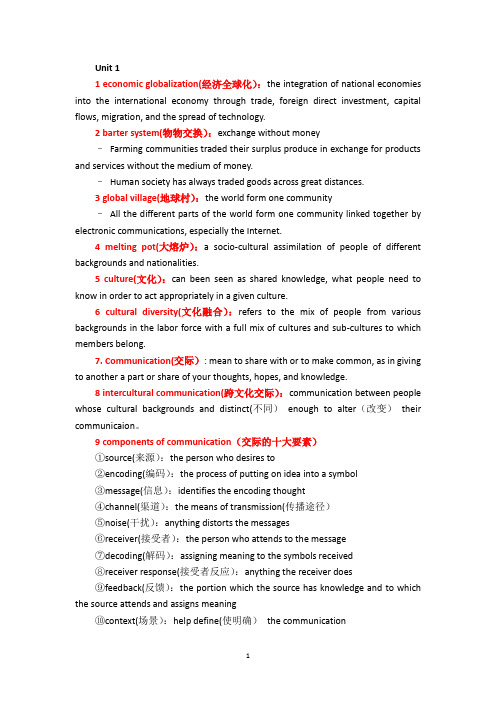
Unit 11 economic globalization(经济全球化):the integration of national economies into the international economy through trade, foreign direct investment, capital flows, migration, and the spread of technology.2 barter system(物物交换):exchange without money–Farming communities traded their surplus produce in exchange for products and services without the medium of money.–Human society has always traded goods across great distances.3 global village(地球村):the world form one community–All the different parts of the world form one community linked together by electronic communications, especially the Internet.4 melting pot(大熔炉):a socio-cultural assimilation of people of different backgrounds and nationalities.5 culture(文化):can been seen as shared knowledge, what people need to know in order to act appropriately in a given culture.6 cultural diversity(文化融合):refers to the mix of people from various backgrounds in the labor force with a full mix of cultures and sub-cultures to which members belong.7. Communication(交际): mean to share with or to make common, as in giving to another a part or share of your thoughts, hopes, and knowledge.8 intercultural communication(跨文化交际):communication between people whose cultural backgrounds and distinct(不同)enough to alter(改变)their communicaion。
跨文化交际的关键技巧总结

跨文化交际的关键技巧总结在跨文化交际中,不同的文化背景和价值观往往会带来许多困难和挑战。
然而,通过一些关键的技巧和策略,我们可以更好地处理这些挑战,促进跨文化交际的成功。
以下是一些跨文化交际的关键技巧总结。
一、尊重和理解他人的文化在跨文化交际中,尊重和理解他人的文化是至关重要的。
我们应该积极学习和了解对方的文化,包括其价值观、传统、习俗和礼仪等。
这样一来,我们就能更好地理解他们的行为和表达方式,并避免因为文化差异而产生的误解和冲突。
二、保持开放和灵活的心态在与不同文化背景的人交往时,我们应该保持开放和灵活的心态。
不同文化之间存在着诸多差异和差异,我们应该摒弃自己对某种文化固有的刻板印象和偏见。
同时,我们还应该愿意接受新的观念和观点,为不同的文化背景提供积极的回应,以促进良好的跨文化交际。
三、注意非语言交流在跨文化交际中,非语言交流是十分重要的。
姿势、表情、眼神以及身体语言等都能传达出我们的态度和情感。
因此,在交流时应该注意自己的非语言信号,同时也应该积极学习并解读对方的非语言信号。
这样一来,我们就能更准确地理解对方的意思,并更好地与其进行交流。
四、运用适当的语言和词汇语言是跨文化交际的重要工具,合理运用语言和词汇能够更好地与对方进行沟通。
在与非母语人士交谈时,我们应该尽量使用简洁明了的语言,避免使用复杂的词汇和难以理解的俚语。
同时,还应该注意自己的语速和语调,尽量避免口音过重或讲话过快而导致对方理解困难。
五、询问和澄清不清楚的问题在跨文化交际中,我们不可避免地会遇到一些不清楚的问题或者是存在误解的情况。
在这种情况下,我们应该积极主动地询问和澄清,以确保我们对对方的意图和表达有准确的理解。
如果有必要,我们可以多次确认对方的意思,增强双方之间的沟通和理解。
六、培养跨文化交际的敏感性跨文化交际的成功与否也取决于我们对不同文化的敏感性。
我们应该培养自己对于他人文化的敏感,包括尊重他们的信仰、习俗和价值观等。
- 1、下载文档前请自行甄别文档内容的完整性,平台不提供额外的编辑、内容补充、找答案等附加服务。
- 2、"仅部分预览"的文档,不可在线预览部分如存在完整性等问题,可反馈申请退款(可完整预览的文档不适用该条件!)。
- 3、如文档侵犯您的权益,请联系客服反馈,我们会尽快为您处理(人工客服工作时间:9:00-18:30)。
Unit 11 economic globalization(经济全球化):the integration of national economies into the international economy through trade, foreign direct investment, capital flows, migration, and the spread of technology.2 barter system(物物交换):exchange without money–Farming communities traded their surplus produce in exchange for products and services without the medium of money.–Human society has always traded goods across great distances.3 global village(地球村):the world form one community–All the different parts of the world form one community linked together by electronic communications, especially the Internet.4 melting pot(大熔炉):a socio-cultural assimilation of people of different backgrounds and nationalities.5 culture(文化):can been seen as shared knowledge, what people need to know in order to act appropriately in a given culture.6 cultural diversity(文化融合):refers to the mix of people from various backgrounds in the labor force with a full mix of cultures and sub-cultures to which members belong.7. Communication(交际): mean to share with or to make common, as in giving to another a part or share of your thoughts, hopes, and knowledge.8 intercultural communication(跨文化交际):communication between people whose cultural backgrounds and distinct(不同)enough to alter(改变)their communicaion。
9 components of communication(交际的十大要素)①source(来源):the person who desires to②encoding(编码):the process of putting on idea into a symbol③message(信息):identifies the encoding thought④channel(渠道):the means of transmission(传播途径)⑤noise(干扰):anything distorts the messages⑥receiver(接受者):the person who attends to the message⑦decoding(解码):assigning meaning to the symbols received⑧receiver response(接受者反应):anything the receiver does⑨feedback(反馈):the portion which the source has knowledge and to which the source attends and assigns meaning⑩context(场景):help define(使明确)the communication思考题:1.Discuss the four trends that make our world more interdependent.①convenient transportation systems(便捷的交通系统)②innovative communication systems(革新通信技术)③economic globailzation(经济全球化)④widespread migrations(广泛的移民)2.What are the three ingredients(组成) of culture?①artifacts(the material and spiritual products people produce)②behavior(what they do)③concepts(共有观点)(what they think)3.How to understand cultural iceberg?just as an iceberg, culture has some aspects that are observable and others that can only be suspected an imagined. Also like an iceberg, nine-tenth of culture is below the surface4.What are the characteristic(特点)of culture?①shared②learned(enculuration 文化习得:learning one's culture)③dynamic(动态的)(accultration文化适应:adopts the changes brought about by another culture)④ethnocentric(ethnocentrism文化中心主义:own cultural background issuperior)5.What are the characteristic of communication?①dynamic(动态性);②irreversible(不可逆转的)③symbolic(符号的)④systematic(系统性)⑤transactional(互动性)⑥contextual(语境)Unit 2-41 Pragmatics(语用学):the study of the effect that language has on human perceptions and behavior.2 Semantics(语义学):a system that associates words to meaning. It is the study of the meaning of words.3 Denotation(引申含义):the literal meaning or definition of a word --- the explicit, particular, defined meaning.精讲案例:Case1.Case3(p17).Case4(p19).Case2(p43).Case3(p45).Case1(p67).Case3(p69)思考题:1.How is Chinese addressing different from American addressing?①In Chinese the surname comes first and is followed by the given name;in English this order is reversed.②In China seniority(资历)is paid respects to.Nowadays, many English-speaking people tend to address others by their given names, even when meeting for the first time.(About addressing by relationship)Chinese often exten kinship terms to people not related by blood or marriage.Americans tend to use just the first name and leave out the term of relationship.Chinese use a person's title、office、or profession to indicate(表明)the person's influential(有权势的)status .In English, only a few occupations or titles could be used,such as doctor, governor, mayor, professor, nurse and captain.(p24)2. What are the social functions of compliments?(赞美的社会功能是什么?)Creating or reinforcing(加固)solidarity, greeting people, expressing thanks or congratulations, encouraging people, softening criticism(委婉批评),starting a conversation, or even overcoming embarrassment(窘迫).Unit 51 Chronemics(时间学):The study of how people perceive and use time.(1) Polychromic Time: paying attention to and doing only one thing at a time.(2)Polychronic Time(多元时间观念): being involved with many things at once.2 Proxemics(空间学):Refers to the perception and use of space.3 Kinetics(身势学):the study of body language.身势学4 Paralanguage(副语言):Involving sounds but not word and lying between verbal and nonverbal communication .精讲案例case1(p85).case3(p87).case5.6(p90).case7(91).思考题:1.What are the different features of M-Time and P-time?M-Time think time is perceived as a linear strucure.认为时间是线性的P-Time is less rigid(刻板)and clock-bound,more flexible and more human-centered.2. How is the Chinese writing style different the American writing style?The Chinese employ a circular approach in writing. In this kind of indirect writing, the development of the paragraph may be said to be ‘turning and turning in a widening gyre’. The circles or gyres turn around the subject and show it from a variety of tangential views, but the subject is never looked at directly. A paragraph is set off by an indentation of its first sentences or by some other conventional devise, such as extra space between paragraphs.In contrast, the Americans are direct and linear in writing. An English expository paragraph usually begins with a topic statement, and then, by a series of subdivisions of that topic statement, each supported by example and illustrations, proceeds, to develop that central idea and relate that idea to all other ideas in the whole essay, and to employ that idea in proper relationship with the other ideas, to prove something, or perhaps to argue something.3. What are the different feature of m-time and p-time? P97M: Do one thing at a timeTake time commitments seriouslyAre committed to the jobAdhere religiously to plansEmphasize promptnessAre accustomed to short-term relationshipsP: Do many things at onceConsider time commitments an objective to be achieved, if possibleAre committed to people and human relationshipsChange plans often and easilyBase promptness on the relationshipHave strong tendency to build lifetime relationshipsM-time is noted for its emphasis on schedules, segmentation, punctuality and promptness. It features one event at a time and time is perceived as a linear structure.P-time is less rigid and clock-bound. It features several activities at the same time and time is perceived as more flexible and more human-centered.4. What different worldview can be drive from Buddhism(佛教)and Christianity(基督教)?Buddhists do not believe in a god or gods who created the world. However, they do believe that there is a supreme and wonderful truth that words cannot teach, and ritual cannot attain.Buddhists are not favorably disposed to the notion of free enterprise and the pursuit of material well-being. Seen from a western worldview, having no desires adversely affects motives for personal enrichment and growth generally. Thus, little support is accorded to free enterprise.Christianity recognizes the importance of work and free ownership of property. Protestant, in particular, sees the salvation of the individual through hard work and piety.5. What is the American cultural value like in terms of value orientation?(美国文化价值取向)As far as the human nature is concerned, the American culture holds that it is evil but perfectible through hard work.As to the relation of man to nature, they think mankind can conquer the nature.They also have a linear time concept and therefore they are future-oriented.They focus on doing and think that only actions can solve the problem.They are quite individualistic and therefore they focus less on the benefits of the group.6.Discover the meaning of some common gestures in English①good luck②feel surprised③I don't know④Pardon! Can't hear⑤That's enough, Please over⑥thamb-dowm⑦Sth strange/odd⑧Come here⑨in the U.S., meaning "OK"⑩in Italy, meaning "Hero". in U.S., "goodbye"⑾Oh, I forgot⑿Slow down/Relax/Wait a second.Unit 6精讲案例case1(p115).case2(p116).p124-126中的小案例思考题:1. What are the two primary influences processes of Gender Socialization?Family communicationRecreational interaction2. How is gender different from sex? P119~120Sex: biological, permanent, with a individual propertyGender: socially constructed, varied over time and across cultures, with a social and relational qualityUnit 7精讲案例case1(p137).case3(p139)1 Discuss the concepts of high context culture and low context culture.Eastern culture favors verbal hesitance and ambiguity in order to avoid disturbing or offending others, the burden of smooth communication effective is shared equally between all parties involved.The Western communicative mode is primarily(直接)direct, explicit(明确),and verbal, relying heavily on logical and rational perception(感知),thinking,and articulation. So the task of communicating effectively lies primarily on the speaker.Unit 91 A planetary culture(行星文化): integrates Eastern mysticism with Western science and rationalism(理性主义).2 Intercultural person(跨文化的人): represents someone whose cognitive(认知的), affective, and behavioral(行为的)characteristics are open to growth beyond the psychological parameters(心理界限)of his or her own culture.1. Identify the features of each of four Hofsted’s cultural dimensions and the contrast between high-context and low-context culture.Individualism(个人主义)VS collectivism(集体主义)/ Masculinity(刚性文化)VS femininity (柔性文化)/ Power distance(权利差距)/ Uncertainty avoidance (不确定性规避)High-context cultures(含蓄的文化)assign meaning to many of the stimuli surrounding an explicit message. In high-context cultures, verbal messages have little meaning without the surrounding context, which includes the overall relationship between all the people engaged in communication.Low-context cultures(外向型的文化)exclude many of those stimuli and focus more intensely on the objective communication event, whether it be a word, a sentence, or a physical gesture. In low-context cultures, the message itself means everything."I"culture(个体主义):1.Freedom to control their won destiny 2.Self-reliance to stand on their own feet 3.Privacy to mind their own business 4.Family ties tend to be relatively unimportant"We"culture(集体主义):1.Harmony to strive for the common good petition is not encouraged 3.Limit rights to property 4.Filial piety(孝顺)5.Inter-dependantPower distance(权利差距):describes the distribution(分布)of influence within the culture, the extent to which the less powerful members of organizations and institutions accept and expect that power is distributed unequally. Cultures areclassified on a continuum(延续体)of high to low distance, that is hierarchy(等级主义)v.s. egalitarian(平等主义).Masculine cultures(刚性文化):These cultures place high values on maculine traits and stress assertiveness, competition and material success.Feminine cultures(柔性文化):These cultures place high values on feminne traits and stress quality of life, interpersonal relationships and concern for the weak.其他名词解释:1. Enculturation(文化习得): all the activities of learning one’s cu lture are called enculturation9. Acculturation(文化适应): the process which adopts the changes brought about by another culture and develops an increased similarity between the two cultures. 10. Ethnocentric(文化中心主义): the belief that your own cultural background is superior.11. Communication: mean to share with or to make common, as in giving to anothera part or share of your thoughts, hopes, and knowledge.12. Components of Communication:Source交际邀请The source is the person with an idea he or she desires to communicate. Encoding编码Unfortunately (or perhaps fortunately), humans are not able to share thoughts directly. Your communication is in the form of a symbol representing the idea you desire to communicate. Encoding is the process of putting an idea into a symbol. Message编码信息The term message identifies the encoded thought. Encoding is the process, the verb; the message is the resulting object.Channel交际渠道The term channel is used technically to refer to the means by which the encoded message is transmitted. The channel or medium, then, may be print, electronic, or the light and sound waves of the face-to-face communication.Noise干扰The term noise technically refers to anything that distorts the message the source encodes.Receiver交际接受The receiver is the person who attends to the message.Decoding解码Decoding is the opposite process of encoding and just as much an active process. The receiver is actively involved in the communication process by assigning meaning to the symbols received.Receiver response接受反应The receiver is the person who attends to the message. Receiver response refers to anything the receiver does after having attended to and decoded the message. Feedback反馈Feedback refers to that portion of the receiver response of which the source has knowledge and to which the source attends and assigns meaning.Context场景The final component of communication is context. Generally, context can be defined as the environment in which the communication takes place and which helps define the communication.16. Connotation(内涵):the suggestive meaning of a word --- all the values, judgment, and beliefs implied by a word the historical and associative accretion of the unspoken significance behind the literal meaning.17. Taboo禁忌语:refers to some objects, words or actions that are avoided by a particular group of people, or in certain culture for religious or social reasons.18. Euphemism委婉语:Means the act of substituting a mild, indirect, or vague term for one considered harsh, blunt, or offensive.谚语:Strike while the iron is hot 趁热打铁More haste, less speed. 欲速不达To pass fish eyes for pearls 鱼目混珠as stubborn as a mule 犟得像头牛dumb bell 笨蛋to fish in the air 水底捞月to drink like a fish 牛饮as dry as sawdust 味同嚼蜡to be at the end of one’s rope 山穷水尽landscape engineer 园林工人tonsorial artist 理发师sanitation engineer 清洁工shoe rebuilder 补鞋匠soft in the head 发疯的reckless disregard for truth 撒谎to take things without permission 偷窃industrial climate 劳资关系紧张justice has long arms 天网恢恢,疏而不漏diamond cut diamond 棋逢对手golden saying 金玉良言fat office 肥缺You will cross the bridge when you get to it船到桥头自然直better be the head of a dog than the tail of a lion 宁为鸡头,勿为牛后tread upon eggs 如履薄冰。
